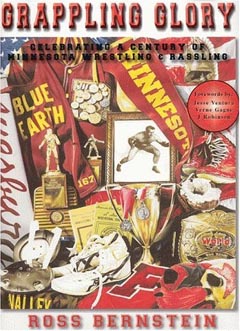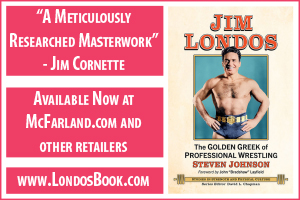Having knocked off his To Do List the sports of football, hockey, baseball and basketball, author Ross Bernstein has turned his attention to the wrestling legacy — both professional and amateur — in Minnesota.

The recently-published Grappling Glory: Celebrating A Century Of Minnesota Wrestling & Rassling is a unique blend of the two disciplines. “As an amateur wrestler myself, I thought it would be fun to tackle both of these, because there’s a lot of crossover,” Bernstein told SLAM! Wrestling.
In fact, Bernstein actually wanted to do a true crossover book, where readers would have to flip it around to read either the amateur story or the pro side, but that didn’t fly with the publisher. Instead, halfway through the book, he makes the leap from the mat to the squared circle.
“I’m not winning any Pulitzers doing what I’m doing. They’re just really fun books. I’m not diving into any investigative journalism, and I understand my books are just fun,” he explained.
Bernstein also does not see this book as a tell-all. “If a lot of bad stuff came up, I left it out. I didn’t feel like Curt Hennig’s kids or grandkids ever needed to read any scandalous stuff that I would contribute. In all of my books, I just choose to focus on positive, fun stuff. And I think that people appreciate that.”Of particular difficulty was how to handle Verne Gagne, a man that Bernstein considers “the godfather of Minnesota wrestling.” As a wrestler, Gagne was a legend both from his amateur days into his pro days. Then he turned to promoting the AWA, and like a lot of promoters over the years, he has his detractors. “I really had to go out of my way to paint a positive picture of Verne,” admitted Bernstein. “I mean that with all due respect, because I’ve written about him in other books – he was a Gopher football star and other stuff. But a lot of people had very negative things to say about Verne. And I sure they do about every promoter. Again, I chose to take the high road with a lot of that stuff. Particularly Jesse [Ventura]. Jesse had some absolutely hilarious stuff to say about Verne. I just chose to leave it out and honor what he did. I don’t know if it would have sold more books or not, but again, I just chose not to go that route. I made sure to tell Greg [Gagne] that, ‘Hey, if Verne has anything negative to say about this, you can tell him that I took extraordinary lengths to portray him in a positive light.’ But having said that, I think it’s tough for Verne to read a lot of it, because it candidly says what happened.”
For those looking for a history of Gagne’s American Wrestling Association, Grappling Glory is a perfect book. Bernstein lays out the story of Minnesota pro wrestling, from its early days to the indy scene of today. He also profiles various personalities from the pro game, both living and dead, big names and small.
The project was a challenge for Bernstein, who grew up a pro wrestling fan but never became a fanatic for the sport. He believes that going in with a “completely unbiased viewpoint” helped when he got around to interviewing Minnesota legends like Stan “Krusher” Kowalski, “Jumpin'” Jim Brunzell, Baron von Raschke and Larry “The Axe” Hennig. “By their nature, a lot of these guys tell tall tales. It was really hard to disseminate what was fact and fiction,” Bernstein laughed.
He came away from the project with a real awe and appreciation for the enthusiasm of wrestling fans. “I kind of equated wrestling with NASCAR. People just get loyal to a certain guy and that’s their guy, and you follow him through thick and thin. I couldn’t believe the underworld, the subculture of websites and newsletters, shrines to people, dead, alive, old, whatever. People are just passionate about it.”
To ease his burden of accuracy for the hardcore fans, Bernstein hired respected Minnesota historian George Shire to vet the book. Yet upon publication, Bernstein still worried, especially about how the amateurs might feel slighted by being in the same book as the hokey pros. “I clearly state that wrestling is an amateur sport and professional wrestling is a form of sports entertainment,” he said. “Guys like ‘Mean’ Gene Okerlund calling to order 10 books to give as Christmas gifts is a great testimonial that they liked the book.”Bernstein wishes that he could have gotten interviews with Ric Flair and Brock Lesnar. “You know how these super celebrities are, they change their cell phone numbers every month. So it was tough,” he said of Lesnar. “While I was writing the book, he was trying out for the Vikings, and he was just not taking any calls. He was just being inundated. Unfortunately, he was sort of my elusive white whale.”
Two people stand out as favorites on the pro side. Eddie Sharkey, who is full of stories from his own days wrestling and later as a trainer to the likes of the Road Warriors, Rick Rude and Barry Darsow, called Bernstein up to say that he loved the book. “I didn’t know if he was going to love the stuff I wrote or not. Everything he told me, but once you read it on paper, it’s ‘Oh my God, he did some pretty crazy stuff!’ And that’s just the stuff I could print. I tried to keep it sort of PG-13. I understand that a lot of kids read from stuff too, so I try to leave a lot of the really, really nasty stuff out.”
But the coup interview was former Minnesota governor Jesse “The Body” Ventura, who has completely turned anti-media since his days in office. “Jesse was great, talking to him, because he’s just such a character. I was hoping to get about five minutes with him. I’d been a guest on his radio show before he became governor. So he knew me and he knew I was going to serve him some softball questions. He knew I wasn’t going to ask him a lot of political stuff. I wound up getting two hours with him. He just opened the vault and started dishing the goods. It was great. I think he appreciated that I did my homework and researched his career.”
Up next for Bernstein is a Minnesota golf book, then a racing one, and another hockey book. In fact, the hockey one has some ties to wrestling, in that it is about the inherent respect and unwritten rules of the business. It’s called The Code, and Bernstein explained it as a book about the “behind-the-scenes, unwritten rules which govern fighting and the rules of retaliation.”
RELATED LINKS:
- Order Grappling Glory at www.bernsteinbooks.com












